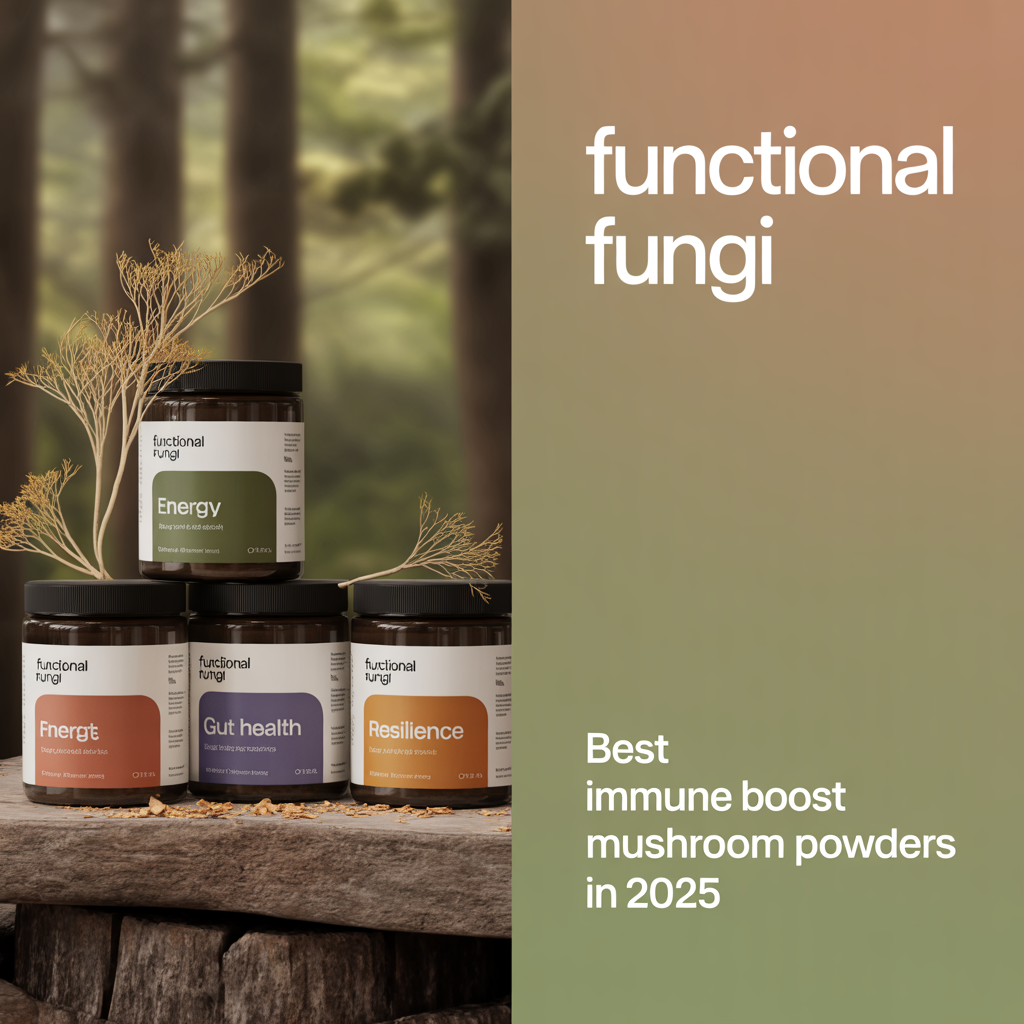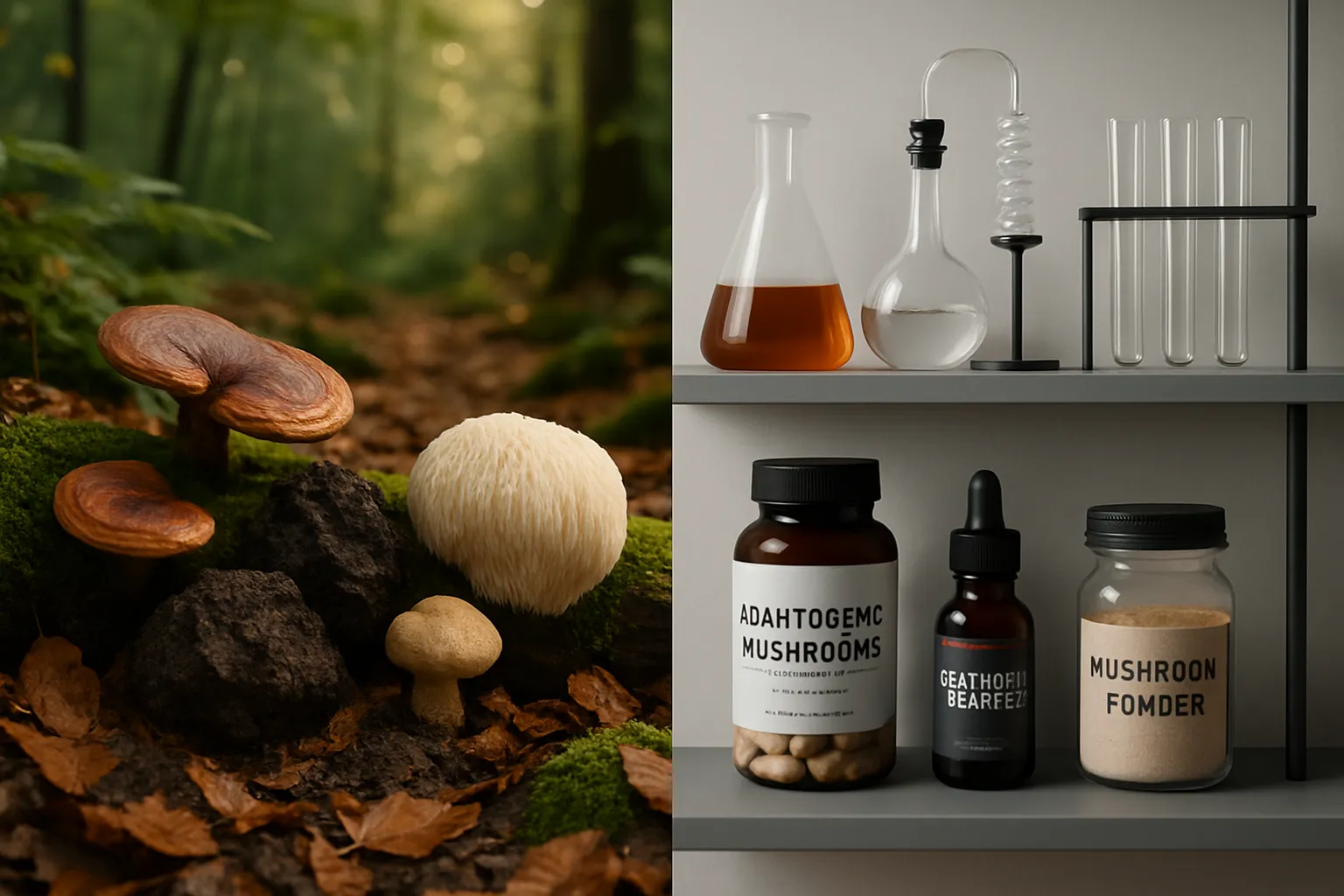
I have to confess: I used to roll my eyes at the mere mention of ‘mushroom powder.’ Fast-forward to 2025, and my pantry’s become a veritable fungi apothecary. The first time I swapped out my sugary vitamin chews for a scoop of Lion’s Mane blend in my coffee, I half-expected to sprout gills—but what actually happened was far better: more resilience, fewer sniffles, and some of the best morning clarity I’ve had since college. Today, let’s look past the hype and gummies to why immune mushroom powders are more than a trend—they’re an inside-out upgrade for stress, energy, and your whole gut-brain reset.
From Forest Floor to Biohacker Shelf: The Case for Adaptogenic Mushrooms
Long before supplement shelves existed, mushrooms were revered as medicine. Ancient shamans brewed fungal concoctions for healing rituals that spanned millennia. These weren’t random forest foraging adventures—they were sophisticated healing practices that modern science is finally catching up to.
The last decade has been a game-changer for adaptogenic mushrooms. Research shows these fungi possess remarkable adaptogenic, prebiotic, and neuroprotective effects that our ancestors somehow understood intuitively. We’re talking about species like Reishi, Chaga, Turkey Tail, and Cordyceps—each with distinct mechanisms that support our bodies in ways conventional mushroom supplements barely scratch the surface of.
I’ll be honest—I was skeptical until my own stubborn winter colds nearly vanished after adding Turkey Tail powder to my daily smoothie routine. Three winters of constant sniffles, and suddenly I was the person who didn’t get sick when everyone else was dropping like flies. That’s when I realized these functional mushrooms for gut health and immunity weren’t just wellness trends.
The Science Behind Ancient Wisdom
Here’s what makes adaptogenic mushrooms different from your typical immune support supplements. They don’t just blast your system with vitamins and hope for the best. Instead, mushrooms like Reishi and Chaga interact with immune cells in surprisingly nuanced ways, supporting balance rather than brute-force stimulation.
Studies indicate that Cordyceps boosts ATP production for energy—literally helping your cells make more fuel. As Dr. Mark Hyman puts it,
“Cordyceps isn’t just for ancient warriors—it’s for modern office athletes.”
That’s the beauty of these adaptogens: they meet you where you are, whether you’re battling stress, fatigue, or just trying to stay resilient.
More Than Just Immune Boosters
What surprised me most was learning that these mushrooms act as immunomodulators, adaptogens, prebiotics, and neuroprotectants all at once. Turkey Tail doesn’t just support immune function—it feeds beneficial gut bacteria. Reishi doesn’t just calm stress—it helps regulate sleep cycles and hormone balance.
This multi-target approach explains why adaptogenic mushrooms have gained serious traction among biohackers. Modern use beautifully blends ancient Asian herbal traditions with scientific validation. We’re not abandoning traditional wisdom—we’re proving it works and understanding why.
Of course, it’s worth noting that no mushroom supplement is FDA-approved as a cancer treatment. But for general wellness, stress response, and immune balance? The research is building a compelling case that our ancestors were onto something profound.
The shift from forest floor to biohacker shelf represents more than a trend. It’s a recognition that nature often provides the most elegant solutions to modern health challenges.

Which Mushroom for What? A (Decidedly Biased) Guide to Picking Your Fungi
Let me be honest—after trying dozens of mushroom powders, I’ve developed some strong opinions about which ones actually work. Each mushroom species has its own signature benefit, and understanding these differences is crucial when you’re looking for the best mushroom powders for immune support 2025.
Reishi: Your Wind-Down Specialist
Think of Reishi as nature’s chill pill. This mushroom is my go-to when stress levels spike and sleep becomes elusive. Better sleep and a calmer mind aren’t just marketing promises here—I genuinely notice the difference when I skip my evening Reishi dose. It works as an adaptogen, helping your body manage stress hormones more effectively.
Chaga: Antioxidant Overload
Living in a city means constant exposure to pollution and environmental toxins. Chaga mushroom benefits center around its incredible antioxidant content—think pollution protection for your cells. It’s like having a cellular cleanup crew working overtime. Research shows Chaga contains some of the highest antioxidant levels found in natural foods.
Turkey Tail: The Gut Hero
Turkey Tail mushroom has become my winter essential. If your season is one long head-cold cycle, this might be your answer. It’s particularly gut-focused, supporting the microbiome where roughly 70% of your immune system lives. The polysaccharides in Turkey Tail work differently than other immune boosters—they’re prebiotics that feed beneficial bacteria.
Cordyceps: Your Natural Pick-Me-Up
Coffee jitters versus actual energy—there’s a real difference. Cordyceps mushroom delivers that afternoon workout boost without the crash. I’ve noticed improved oxygen utilization during exercise, which makes sense given how Cordyceps enhances ATP production at the cellular level. It’s become essential for my training days.
Lion’s Mane: Pure Brain Food
Deadlines used to scatter my focus completely. Since adding Lion’s Mane to my routine, mental clarity has improved noticeably. Lion’s Mane benefits include stimulating nerve growth factor, which supports brain health and cognitive function. It’s not just hype—my productivity during intense work periods has genuinely improved.
“We’re finally learning what herbalists have practiced for ages—mushrooms can be both food and powerful medicine.” – Tero Isokauppila, Four Sigmatic
The Power of Blends
Mushroom powder blends combine these benefits for full-spectrum results. Host Defense MyCommunity Blend contains 17 different mushroom species, making it a broad-spectrum immune tool. FreshCap and Four Sigmatic products use dual-extraction methods for higher beta-glucan counts, which means better bioavailability.
Different mushrooms offer different health benefits, and blends may produce synergistic effects that single-species supplements can’t match. Your choice should align with your primary needs—whether that’s energy, cognitive support, or immune resilience. Personal experience combined with scientific backing makes these functional fungi genuinely useful tools for modern wellness challenges.

Making It Work: How to Actually Use (and Not Waste) Mushroom Powder
Here’s the truth about mushroom powder blends: most people buy them with good intentions, then let them sit in their pantry collecting dust. I’ve been there. The key isn’t just knowing which adaptogenic mushroom supplements to buy—it’s actually using them consistently.
Start with Your Morning Coffee
Add your mushroom powder directly to coffee for focus. Yes, it tastes earthy at first, but trust me, you adapt. I started with half a teaspoon of a cordyceps blend in my morning cup. Within a week, that slight earthiness became familiar, almost comforting. Mushroom supplements for energy like cordyceps work best early in the day when your body can actually use that ATP boost.
Research shows that cordyceps is best consumed in the morning for energy, while reishi should be saved for evening to promote calm. This timing matters more than most people realize.
Consistency Beats Intensity
Best results come from daily use over several weeks—don’t expect overnight magic. The optimal daily dose window requires 2-4 weeks for immune effects to build up. I learned this the hard way after expecting immediate results from my first best mushroom powders for immune support 2025 purchase.
“The most powerful adaptogens are the ones you actually remember to take each morning.” – Paul Stamets, Host Defense
Daily routine matters. Consistency outperforms sporadic mega-doses for immune support every time. Set a phone reminder, keep your powder next to your coffee maker, whatever it takes.
Get Creative with Your Mix-Ins
Get creative: stir into golden milk, blend into protein shakes, or sneak into your oatmeal. Kids barely notice mushroom powder in their morning oats—bonus points for getting adaptogens into the whole family. I’ve mixed turkey tail powder into pancake batter, cordyceps into smoothie bowls, and reishi into evening herbal tea.
The synergy factor is real. Pair your energy boost mushrooms with vitamin D, zinc, or probiotics for maximized results. I take my morning mushroom blend alongside a vitamin D3 supplement, and the combination feels more effective than either alone.
Temperature Matters More Than You Think
Skip the boiling water! Too hot and you lose those delicate actives. Avoid temperatures above 180°F to preserve bioactives. I learned this after wondering why my expensive powder wasn’t working—turns out I was literally cooking away the beneficial compounds by adding it to boiling tea.
Instead, let your coffee cool for a minute or two before stirring in your powder. For hot recipes, add mushroom blends after removing from heat. Your wallet and your immune system will thank you.
The bottom line: mushroom powders work, but only if you actually use them correctly and consistently. Start small, be patient, and make it part of your routine rather than a sporadic health experiment.

Wild Card: Imagining a Fungi-Fueled Future (with a Tangent on Ancient Tea Circles)
Picture this: you walk into your office tomorrow morning, and instead of clustering around the water cooler, your colleagues are gathered around a sleek mushroom tea station. There’s a gentle hum of conversation as someone pours steaming Lion’s Mane benefits brew while another colleague adds Cordyceps powder to their morning latte. If someday our offices replace the water cooler with mushroom tea pots, I’ll happily join the gossip mill.
This isn’t as far-fetched as it sounds. Mushroom supplements are already weaving their way into our social fabric in ways that echo ancient traditions. Did you know that ancient Siberian shamans drank a Chaga decoction to ward off harsh winters? Call it the original adaptogen trend. These weren’t just individual health practices—they were communal rituals that built resilience through shared experience.
Research shows that mushroom use is rooted in community and resilience, and future trends may embrace both health and connection. Today’s biohackers are treating functional mushrooms for gut health and cognitive enhancement like the new third wave coffee movement. There’s something deeply satisfying about the ritual of mixing powders, discussing benefits, and sharing discoveries about which adaptogenic mushrooms work best for different needs.
Modern tea parties could evolve to feature Lion’s Mane lattes and Cordyceps shots for an afternoon boost at the co-working space. I’ve already witnessed this shift in progressive wellness circles—friends gathering not just for social connection, but to experiment with mushroom blends that support everything from stress resilience to mental clarity. The conversation flows differently when everyone’s sipping something that genuinely makes them feel more present and energized.
“Maybe, someday, we’ll have mushroom bars instead of juice bars in every city.” – Tero Isokauppila, Four Sigmatic
Isokauppila’s vision doesn’t seem so wild anymore. We’re already seeing mushroom cafes pop up in major cities, where people gather to sample different functional blends while working or socializing. The appeal goes beyond the health benefits—there’s something grounding about these earthy, brainy brews that coffee alone can’t provide.
The convergence of ancient wisdom and modern wellness culture feels inevitable. Where shamanic traditions once used mushrooms to build community resilience against harsh environments, we’re now using them to navigate the stresses of modern life. The difference is scale and accessibility—what once required specialized knowledge is now available in convenient powder form.
As we move forward, I suspect mushroom supplements will become less about individual optimization and more about collective wellness. The future might hold mushroom meditation circles, adaptogenic book clubs, or even corporate wellness programs centered around functional fungi. The social aspect isn’t just nice to have—it amplifies the benefits through shared intention and community support.
Whether we end up with mushroom bars on every corner or simply more intentional ways to incorporate these powerful adaptogens into our daily routines, one thing seems certain: the future of wellness is both ancient and innovative, individual and communal, earthy and elevated.
TL;DR: If you’ve been curious about adaptogenic mushroom blends, 2025 is the year to make the leap: they offer science-direct benefits for immunity, energy, gut health, and clarity, all in one scoop. Say goodbye to sick days and brain fog—just don’t forget to check for legit, research-backed brands!


